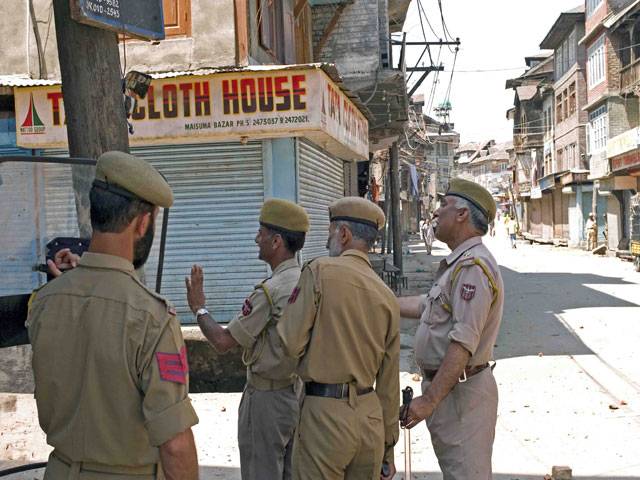SRINAGAR - Gasping for breath and confined to her bed, Bilqees Khan winces as she recalls the moment a pepper gas grenade exploded by her home during a curfew in Indian-occupied Kashmir’s summer capital.
“There was all this dark smoke and then I started to choke,” says the 56-year-old housewife. “It felt as if my chest was bleeding from the inside.”
The grenade exploded outside her house in the Urdu Bazaar neighbourhood of Srinagar as local security forces patrolled the streets after nightfall.
The smoke from the canister wafted into the family’s home, leading Bilqees — who has a history of heart problems — to collapse on the floor of her upstairs bedroom.
She was then rushed to hospital in a neighbour’s autorickshaw and spent the next few days fighting for her life on a respiratory support machine.
Doctors say such stories are increasingly common in Indian-occupied Kashmir where government forces use an array of ‘non-lethal’ weapons to maintain security.
Scores if not hundreds of people have been injured by weapons including marbles fired from slingshots, pellet guns and the so-called pepper grenades which are packed with chemicals.
Exact figures are impossible to compile as many victims do not report their injuries for fear of being charged with rioting.
Although the weapons are meant to target mainly youthful protesters, doctors say children and the elderly are particularly vulnerable from the effects of the chemicals contained in the pepper grenades.
Hospital sources in Srinagar say at least three recent deaths have been due to the effects of the pepper gas, including that of Hajira Begum, a 60-year-old woman, on March 8.
Amnesty International has demanded an independent inquiry into the deaths and called for an immediate halt to its use.
Violence in Held Kashmir - a scenic Himalayan region — had waned in recent years after a revolt began in 1989.
But tensions have mounted since last month’s execution of a Kashmiri Muslim over a deadly 2001 attack on the Indian parliament in New Delhi.
There have been widespread protests in the region over the last few weeks, with demonstrators defying frequent curfew orders and clashing with police.
Abdul Gani Mir, Held Kashmir’s inspector general of police, defended the use of weapons such as pepper gas and marbles saying his officers “assess the situation for an appropriate response”.
“Our focus is to avoid casualties,” he told AFP, adding that he had not received any complaints about pepper gas. But doctors who have treated patients with symptoms including loss of vision as well as skin irritation say its effects should not be underplayed. “We don’t know the exact chemical composition of the gas, but for people with acute asthma or allergy it can be particularly lethal,” said Parvaiz Koul, a doctor at the Sher-i-Kashmir Institute of Medical Sciences. Altaf Hussain, a Kashmir-based paediatrician who has treated around a dozen children from the effects of the gas, warned it carries other dangers. “Repeated exposure of children to this pepper gas can damage tender cornea and cause them permanent blindness,” he told AFP.
Tariq Gojri, 18, a street hawker, was blinded in his right eye earlier this month after being shot by a pellet gun as he popped out to pick up some milk from a neighbour in Baramulla, north of Srinagar.
After being hit when police fired at a group of protesters, things got even worse when his neighbours took him to a local hospital.
“The police came into the hospital and started arresting anyone who had been injured during the protests,” Tariq said.
“My eye was still bleeding and I had to hide under a blanket in the maternity ward,” he added. He later fled the town and took refuge in Srinagar.
The fear of arrest has dissuaded many casualties from seeking treatment, sometimes with disastrous consequences.
A 26-year-old graduate student, speaking on condition of anonymity, told AFP he lost his sight in one eye after he was hit by a marble fired by a police slingshot.
“I had to flee the hospital twice to avoid arrest and couldn’t get proper treatment on time,” said the student, who has not been home since the injury. The death of 120 unarmed people during protests in 2010 led to a rethink of tactics by the security forces, including the introduction of pepper gas on the basis that it was not deadly.
But some experts have argued that it is illegal as India is a signatory to an international chemical weapons protocol. Even the government-appointed State Human Rights Commission has called for a complete halt to its use.
Mir Saifullah, law minister in the Held Kashmir state government, defended its use last week as he met a group of local lawmakers.
The gas was “necessary to maintain law and order otherwise elements who don’t want peace stand to benefit,” he said.
Saturday, April 20, 2024
Alarm raised over use of ‘non-lethal’ weapons in IHK

New Zealand ram put down after death of elderly couple
April 20, 2024
Netflix beats expectations on profit and subscribers
April 20, 2024
A Tense Neighbourhood
April 19, 2024
Dubai Underwater
April 19, 2024
X Debate Continues
April 19, 2024
Hepatitis Challenge
April 18, 2024
IMF Predictions
April 18, 2024
Kite tragedy
April 19, 2024
Discipline dilemma
April 19, 2024
Urgent plea
April 19, 2024
Justice denied
April 18, 2024
AI dilemmas unveiled
April 18, 2024
ePaper - Nawaiwaqt
Advertisement
Nawaiwaqt Group | Copyright © 2024





